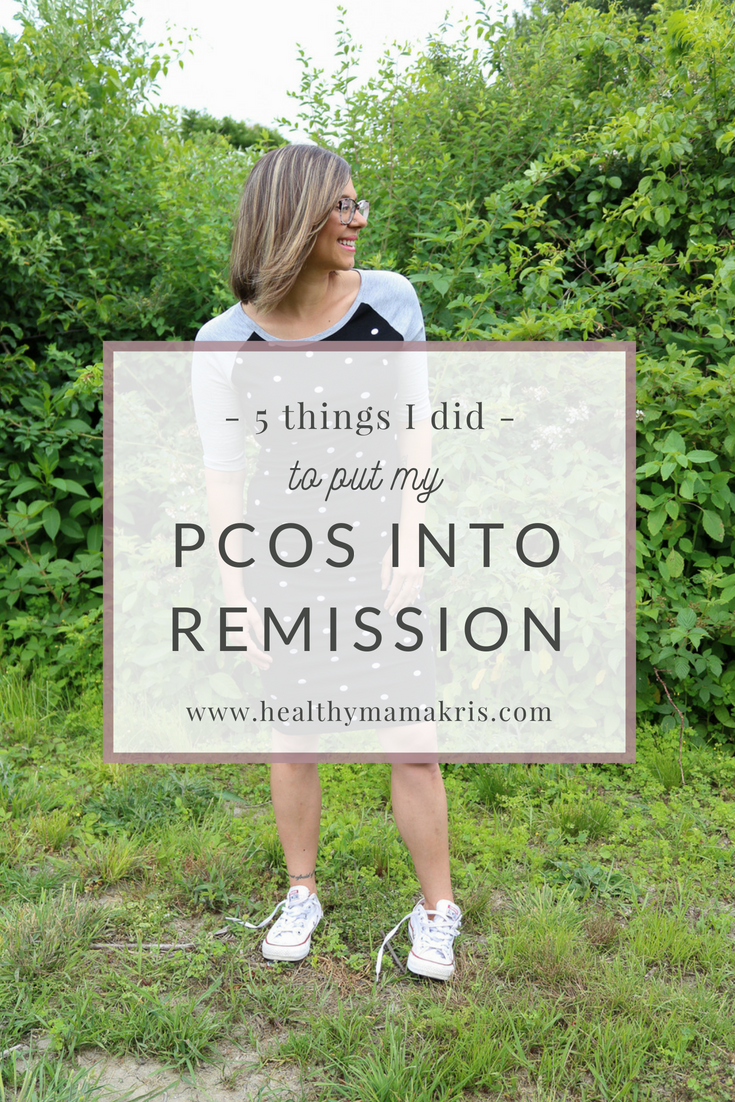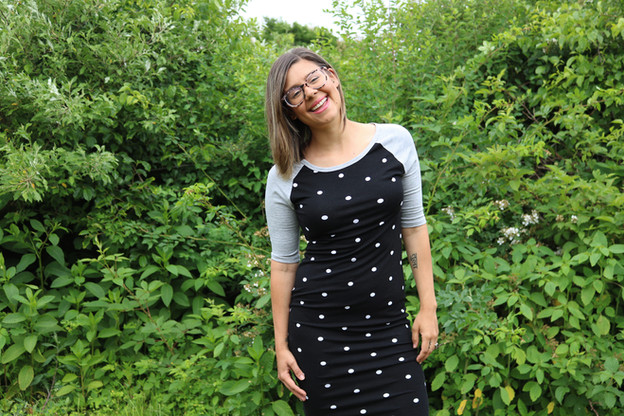
The leading cause of infertility… a lifelong disorder… struggles with weight gain… increased risk of metabolic syndrome, diabetes and heart disease… no known cure…
Those are some scary statistics to take in when you’re only 26 years old, married with a two year old, as fit as you’ve ever been in your entire life, yet feeling the most awful you ever have. You wonder, Will I ever feel better?… Will I ever be able to have another baby?… What did I do wrong?!…
PCOS is the leading cause of infertility among women in the US, and is estimated to effect 8-10% of the population of women of reproductive age. 8-10%! That is no small statistic, and yet, I had only ever heard of it in passing in my nutrition training. I heard the generalized picture of a woman with PCOS: obesity, hirsutism (excess hair growth) combined with male patterned baldness, acne, excess androgens and/or low female hormones, irregular or missing periods, and of course- cysts on the ovaries. It didn’t sound like me. Sure, I had struggled with my weight, but I wasn’t obese. I’d had terrible acne as a teen, but I had that under control. The only excess hair growth I had to speak of was that one pesky hair on that one mole and I certainly wasn’t balding. I didn’t know of any cysts on my ovaries and wasn’t everyone’s period irregular?! I moved on without another thought.
Then, my health crash came. I was two months post competing in my first (and last) fitness competition. I was in the best shape, physically, I had ever been in my entire life, but my health was crumbling around me. I could no longer lift a 10-pound weight without feeling like it was 50. I was falling asleep with my 2-year-old playing around me at 2 in the afternoon. I hadn’t had a cycle in over a year and my acne had come back with a vengeance. Not to mention the rebound weight gain from my competition was massive even with eating incredibly carefully and my coach scolded me for not sticking with my post-competition plan (I fired her). I knew enough to know my hormones were a wreck. I went to my GP and she did only the very basic testing- she was convinced I was fine, my body just needed to ‘re-adjust’. I knew something else was up. Thankfully, my nutritionist took me seriously and we did some testing. My adrenals were completely out of whack (not a surprise), but the most shocking part of it all– my androgens (male hormones) were so sky high, she was convinced I must be taking them supplementally or rubbing them directly into my skin.
Nope and nope.
Testosterone 6x the normal amount for an adult male. DHEA three times higher than it should be. Estrogen low and progesterone in the tank. My fasting blood glucose was also high (not surprising- I had gestational diabetes previously). I was a wreck. We went through my health history, and the pieces started to fall together. Early onset of menstruation, with very painful and incredibly irregular periods. My cycle ‘evened out’ when I went on the pill and became irregular as soon as I went off of it. Cystic acne as a teenager that again- evened out with the pill, was sporadic as an adult and came back strong when I set my hormones astray with my competition. My constant struggle with weight, starting as a pre-teen. I noticed a lack of regular ovulation when I was trying to get pregnant. It was very clear to both of us, now: I had PCOS.
Important side note- I did have my diagnosis confirmed by a doctor. Nutritionists, myself included, are not qualified to diagnose or treat any kind of disease or condition. Often, they can help identify route cause and direct clients towards the medical diagnosis and attention they need and help to manage symptoms dietarily.
Being a fit, young woman who successfully had a baby made me the last person you would look at and say “Yeah, she’s got PCOS”. Yet there it was. The looming diagnosis of a lifelong syndrome (a syndrome is not a disease yet a combination of symptoms that occur together to creation a condition), possible future infertility and substantially increased risk of some scary chronic health conditions like diabetes and heart disease was terrifying. But at the same time, it was freeing.
I wasn’t crazy. The symptoms I had been experiencing for years and years were real. The diagnosis explained so much– and yet there is ‘no known cure’. Doctors typically prescribe women with PCOS medications to manage symptoms: birth control pills to increase female hormones to produce a monthly breakthrough bleed (not real menstruation), control acne and hirsutism; blood sugar or insulin controlling drugs to manage weight gain and normalize blood sugar. All of these solutions are not real solutions at all- but bandaids to mask symptoms; not necessarily improving the health of the woman who is struggling. I knew there had to be another way. And, there was.
PCOS is a syndrome, like I mentioned above- it is a combination of symptoms that create a condition. So what if we were able to tackle each symptom, one by one, determining the root cause and managing each one both separately and together to remove the symptom? What if, one by one, I no longer had symptoms? What would happen then? Well, I would effectively be in remission. A year and a half later, I was not only in complete remission from my PCOS- after months of trying, I was also pregnant for a second time. Here are five of the major things I did to put my PCOS into remission.
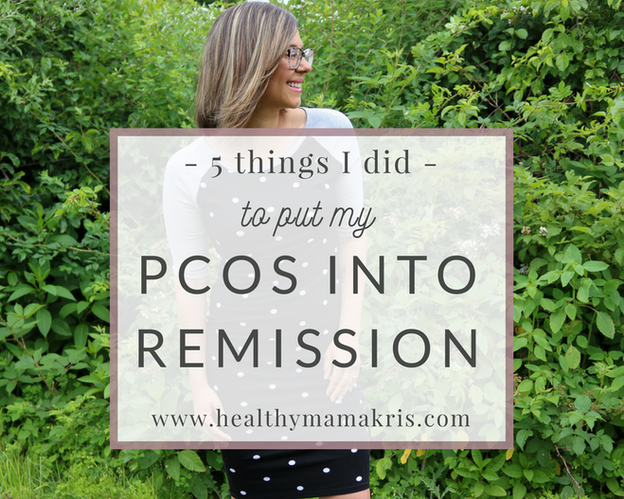
1. I reduced stress
Hormones are our body’s primary messenger system, and just like when something is off in the delivery route of your Amazon package– it doesn’t arrive on time like it should. Obviously, the body’s hormonal system is much more complicated than that- but it is a helpful analogy to explain that when one part is off- it affects the entire cascade. Stress is detrimental to PCOS on multiple levels. Cortisol is your body’s main stress hormone, produced by the adrenal glands and it’s incredibly beneficial in acute situations. It does things like increase our heart rate and bump up the inflammatory process, increase our blood sugar for quick energy production. The problem comes when our cortisol levels are increased on the regular, increasing inflammation and furthering blood sugar imbalances (cortisol levels increase when blood sugar is too low– so it can be a chicken-or-the-egg situation) and as I’ll explain- blood sugar is a key factor in managing PCOS symptoms. This is the best explanation I have found on the effect of stress on PCOS. Stress also effects progesterone levels, from which cortisol is synthesized from from. If you are under chronic stress, a biological mechanism nicknamed the ‘pregnenalone steal’ (pregnenalone is a master hormone) prioritizes using whatever progesterone you have floating around to do it– instead of doing it’s job in the ovaries to regulate our cycles. Women with PCOS often already have low progesterone levels, causing a relative estrogen dominance- furthering PCOS symptoms. Further, when the body is under a high level of stress, it naturally downregulates sex hormone production (making babies is not a biological necessity like breathing is), in these situations, the hypothalamus signals the body to stop making ovarian hormones, halting ovulation and throwing off the hormone cascade. However, despite the ovaries being blamed for much of the increase in adrogen hormones (‘male’ type hormones), the adrenals made 80% of our DHEA and up to 25% of our testosterone. It’s estimated up to 30% of women with PCOS have androgen excess coming from the adrenals. It is important to mention: there are different types of PCOS, as no woman is alike- increased androgens can be coming from either the adrenals or the ovaries; women have different levels of progesterone and estrogen, and stress effects us in different ways, which is why it’s important to determine root cause of PCOS symptoms (working with an experienced practitioner can help with this). However, reducing stress is ALWAYS key to managing PCOS symptoms.
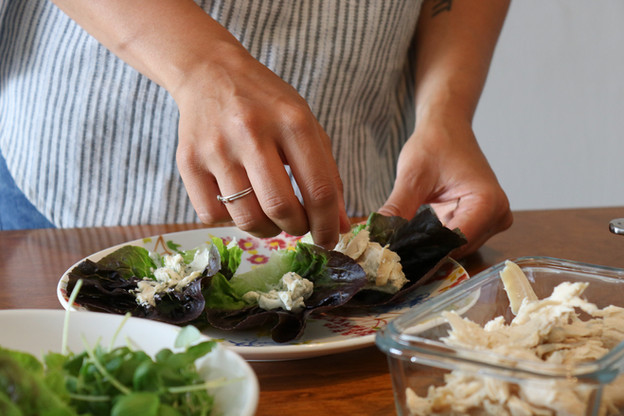
2. I balanced my blood sugar.
Balancing my blood sugar was THE most effective change I made towards managing my PCOS symptoms and bringing my entire body back into balance. Despite eating healthy, whole foods, I wasn’t eating in balance– and my blood sugar was completely out of whack as a result. This was evidenced by my experience with gestational diabetes during my first pregnancy, and the struggle to get my blood sugar back into balance thereafter. As I mentioned above, blood sugar imbalance can occur from internal mechanisms governing blood sugar and insulin (the hormone that reduces the sugar in our blood) levels, as well as external, the way we consume and combine foods. Insulin resistance is one major marker in nearly all cases of PCOS (70% of women with PCOS have insulin resistance). Whether PCOS results from insulin resistance or insulin resistance comes along with PCOS is not completely known- it might be a little bit of both. Insulin resistance results when the body no longer responds to insulin in the way it should- lowering blood sugar levels; causing blood sugar to remain high and insulin to build up in our blood, the body requiring higher and higher amounts of insulin to lower blood sugar to normal levels. High insulin levels exacerbate PCOS symptoms, stimulating the ovaries to produce more androgen hormones (specifically testosterone). It has also been shown to inhibit sex-binding globulin hormone (SBGH), further increasing the build up of excess sex hormones in the body. Insulin resistance can occur due to a constant elevated level of blood sugar, or constant extremes– high spikes in blood sugar (requiring an abnormal amount of insulin to be secreted) followed by extreme lows. This can be caused- as it is most often, by an excess of carbohydrates rich foods, especially those high in sugar and low in fiber, or an imbalance between carbohydrate rich foods and protein-and-fat-rich foods (both which help to naturally balance blood sugar levels). As we saw above, stress is also a contributing factor in insulin resistance- however it’s rarely the primary cause. This is one reason balancing our whole bodies is important in managing PCOS symptoms.
3. I focused on hormone-balancing foods.
Once I got my stress levels under control and balanced my blood sugar, I started really digging into focusing on foods that promoted hormone balancing. I will go into this in much more detail, soon, but some of the foods I focused on included:
Healthy fats. Fat, especially healthy sources of saturated fat, are essential in hormonal balance, as fat and cholesterol are required for proper synthesis of hormones. We know now that previous recommendations to eat low fat foods have been largely disproven, and eating a diet high in healthy fats has been proven extremely healing in women with hormone disorders, PCOS included. Omega-3 fats like those from salmon and other wild caught fish are also effective in reducing inflammation levels, which we know contributes to a myriad of PCOS symptoms (as well as chronic disease). In the same vein, it was also important to really focus on reducing my omega-6 consumption.
Cruciferous Vegetables. Cruciferous vegetables are well known for their high levels of diindolylmethane (DIM), which support regulating estrogen levels. To reduce risk of messing with my thyroid (issues can go hand-in-hand with PCOS) I try to cook them most of the time. Cruciferous sprouts, especially broccoli sprouts, are also proven beneficial. High in sulphoraphane, a powerful antioxidant with anticancer properties that also supports detoxification of the liver helps to excrete excess hormones, balancing our estrogen and progesterone levels.
Flax Seeds. Flax seeds, high in plant-based omega-3 fats, contain a special estrogen-binding compound called lignans that help to excrete excess estrogen from the body.
Sea Vegetables. Sea vegetables are incredibly high in minerals, including thyroid-balancing iodine, and hormone-balancing B-vitamins (they also help us to manage stress).
Cinnamon. Cinnamon can be incredibly effective in balancing blood sugar levels and reducing inflammation.
It’s also important to note that one of the best things I did for my hormones was actually reducing my consumption of dairy products (completely eliminating conventional dairy due to the hormonal implications) due to whey’s insulinogenic properties (while it might seem like a good thing that whey stimulates insulin production, and it can be in the short term, as with exercise recovery, chronic increased insulin- as we saw above, can enhance insulin resistance, and the body no longer responds in the way it should to insulin’s signals). I also nearly eliminated soy products (due to their estrogenic effects) and significantly reduced seed oils from my diet.

4. I changed my personal care products and reduced plastics.
This was one thing that I was resistant to for a long time. Though I had already ‘gone natural’ in so many ways, including changing our home cleaning products, toothpaste, filtering our water– as much as I tried to go non-toxic in any way I could I kept going back to more conventional types of personal care products, especially in the realm of skincare and makeup. I had no problem switching to natural body wash (I use an all-natural goat milk soap a friend makes) but face wash for my acne-prone skin was another story. But once I really started focusing on my hormone balance and learning how pervasive endocrine-disrupting chemicals are in our personal care products, (and how little the government regulates them), I knew I needed to start to make the change, for good- for myself and my daughters. Beautycounter has been huge in helping me make the switch to safer skincare and makeup, while being incredibly effective (my skin has literally never looked better). Their Never List excludes endocrine (hormone) disrupting chemicals like parabens and pthalates from all of their products.
Another thing I made a point of doing was reducing plastics in our home. This is SO hard, with plastic being EVERYWHERE- but plastics, including BPA, which has been seen in elevated levels in women with PCOS– though it has been largely removed from many products, it’s not the only endocrine-disrupting plastic. We have done this by using re-usable ziploc bags, bringing our own produce bags to the grocery store and switching to nearly all-glass food containers, and using glass or stainless steel water bottles.
5. I modified my exercise routine
This is another topic that I could go into extensive detail on– but in short, despite exercise being incredibly beneficial for everyone, especially those with PCOS— being mindful about the type and amount of exercise is important. I stopped killing myself in the gym, started walking more, incorporating moderate amounts of strength training and HIIT workouts to help manage my blood sugar and most importantly, I started listening to my body. I stopped caring about what exercise would do for the way my body looked and started focusing on what it would do for the way my body FELT. Exercise is a stress- and though it can be a good one, too much stress of any sort isn’t good- so I stopped pushing myself when I was sore and starting allowing myself more rest and time for recovery. Though endurance exercise is not necessarily recommended for those with PCOS- I have learned to find my own healthy balance in long-distance running in a way that supports balanced hormones (LOTS of rest in between, proper fueling and listening to my body), primarily because of what it does for my mental health. Above all, I’m an advocate for simply moving, in some way, every day- and focusing on fitness that feels good, to you.
Putting my PCOS into remission was not a linear process by any means. There was no step-by-step ‘do this, then do that’ to heal my symptoms and bring my body back into balance. As with any health journey, there were ups and downs, unexpected stresses, times I overdid it with the exercise, neglected to focus on hormone balancing foods and got a bit off track with blood sugar balance. But the overall key was finding my own beautiful balance in living in a way that supports my PCOS symptoms while also allows me to live and enjoy my life, and I am confident that this is possible for any woman struggling with PCOS or other hormone conditions. Start small- reducing stress, listening to your body during exercise, learning to balance your blood sugar and slowly starting to incorporate hormone balancing foods and switching to safer personal care products, until you come to your own place of balance. And if you need help along the way, I’m always here for you, mama.
Want to learn more about the foods I focused on to balance my hormones and feel good again? Join my list for my free 3-day hormone-balancing meal plan.
Get my 3-day Hormone-Balancing Meal Plan
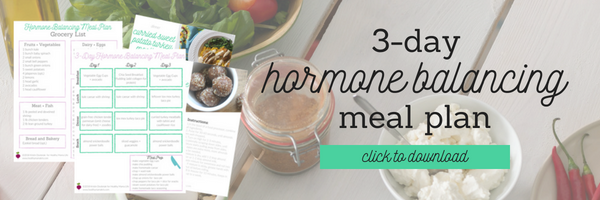
Please note I did all of these things in combination with working with a team of qualified practitioners. Once my nutritionist (she is an NTP) was beyond her scope of practice, she referred me to a Naturopathic Physician to aid me in my healing journey. Unfortunately, my GP offered nothing but medication options, which I prefer to avoid. I worked in conjunction with my nutritionist on dietary changes and my ND on targeted supplements as well as my own personal education and research to come to a point of healing and remission. Whether or not you have PCOS, choose the medication route or not– this is a fabulous place for anyone with hormonal imbalances to begin to manage symptoms and start the journey towards healing. Know that you never have to go at this alone- I highly recommend you seek out practitioners that can help you reach your health goals.
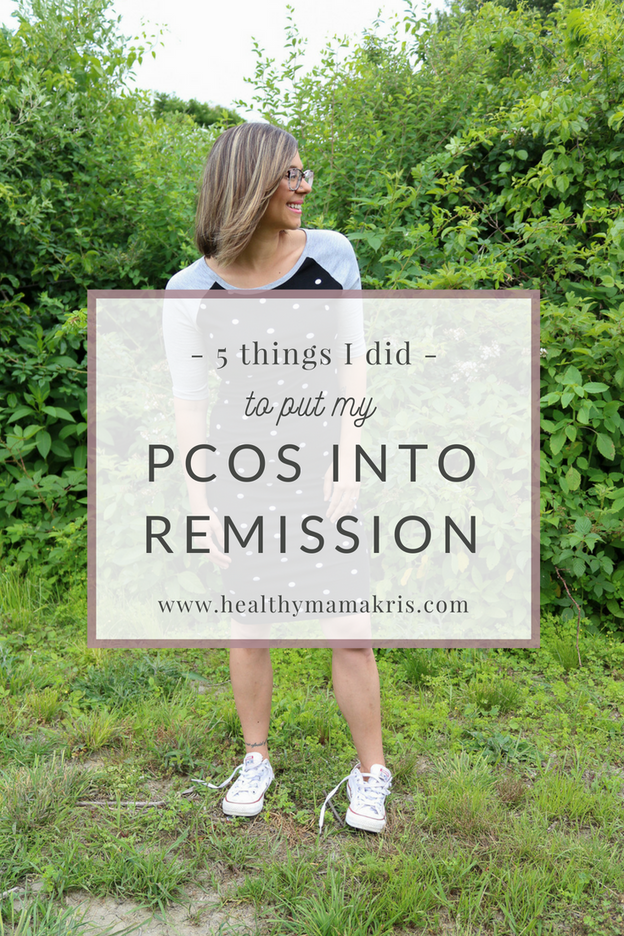
5-day series: how to get started with meal prep for easier meals
free email series
©️ 2025 Kristin Dovbniak for Healthy Mama Kris | Template by Maya Palmer Designs | Privacy Policy | Terms
